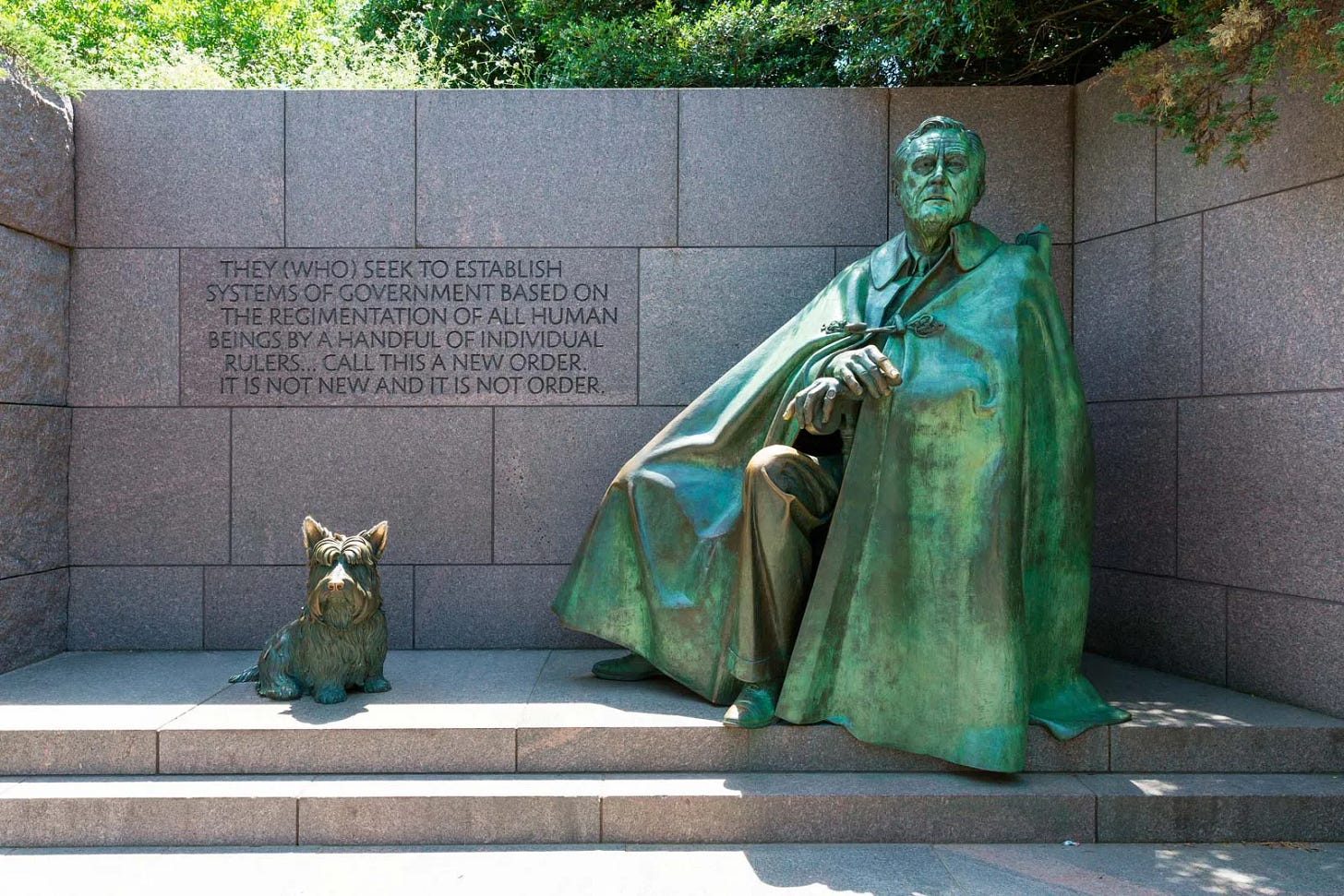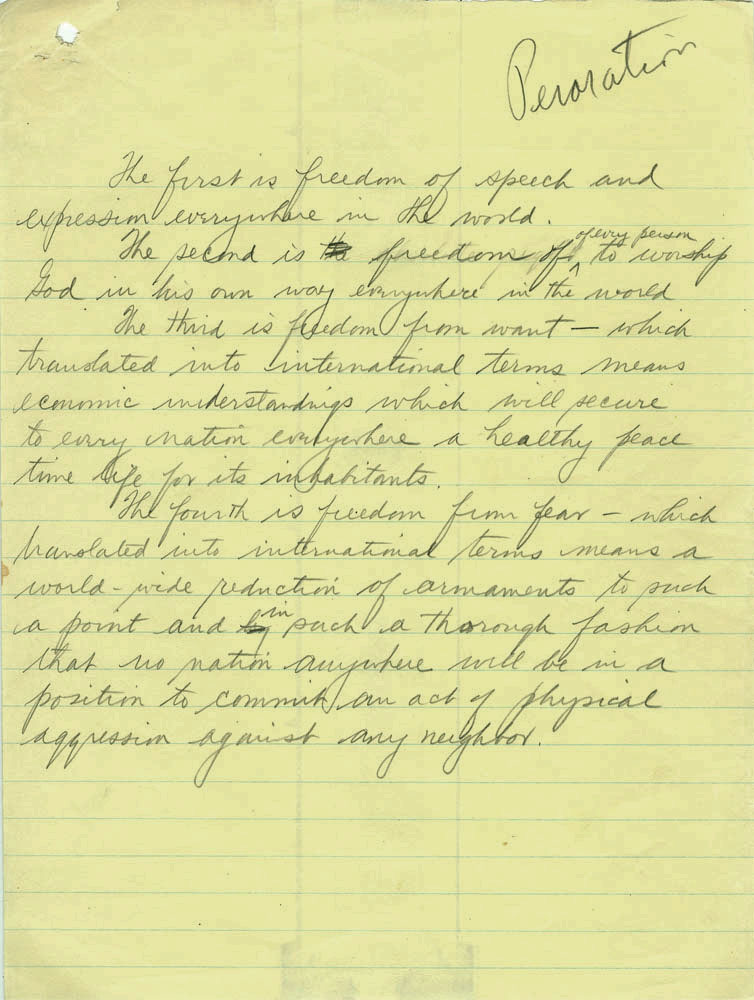On Our Independence Day, A Celebration of FDR's Four Freedoms Speech
FDR delivered this speech on January 6th, 1941
Yesterday, I sent along the text of the Declaration of Independence. Today, on this day when we joyfully celebrate our independence and our freedoms, I am encouraging our community to spend some time with FDR’s Four Freedoms speech. It is, without doubt, one of the most important and consequential speeches ever given in the English language, as its vision became the vision that guided the building of the world after the devastation of WWII. This American-led global system FDR imagined remains intact almost 80 years later, and it has provided unprecedented opportunity and freedom for the people of the world. Looking back, this speech was akin an early draft of a Declaration of Independence for the modern world, which is why I think it’s so appropriate to spend time with it on the day we celebrate our own independence.
What follows is a description of the speech from the website of the FDR Library in Hyde Park, New York, and the closing graphs of the speech itself, which includes the first articulation of the Four Freedoms. I encourage you to read the whole speech, as it speaks to our current moment in very powerful ways, and really is the foundational text of the modern Democratic Party. Get to it when you can in the coming weeks, and enjoy. So much of what we’ve done and who we are as Democrats flow from the vision of this speech and its establishment of “freedom” as our modern party’s foundational value; and it’s why, at this critical juncture in history, so many Democrats, us children of FDR, are once again rallying to ensure that freedom and democracy prevail here in the US and everywhere. It is just who we are, and it is the work that we must do.
Happy Independence Day all - Simon
From the FDR Library
Franklin Roosevelt was elected president for an unprecedented third term in 1940 because at the time the world faced unprecedented danger, instability, and uncertainty. Much of Europe had fallen to the advancing German Army and Great Britain was barely holding its own. A great number of Americans remained committed to isolationism and the belief that the United States should continue to stay out of the war, but President Roosevelt understood Britain's need for American support and attempted to convince the American people of the gravity of the situation.
In his Annual Message to Congress (State of the Union Address) on January 6, 1941, Franklin Roosevelt presented his reasons for American involvement, making the case for continued aid to Great Britain and greater production of war industries at home. In helping Britain, President Roosevelt stated, the United States was fighting for the universal freedoms that all people possessed.
As America entered the war these "four freedoms" - the freedom of speech, the freedom of worship, the freedom from want, and the freedom from fear - symbolized America's war aims and gave hope in the following years to a war-wearied people because they knew they were fighting for freedom.
Roosevelt’s preparation of the Four Freedoms Speech was typical of the process that he went through on major policy addresses. To assist him, he charged his close advisers Harry L. Hopkins, Samuel I. Rosenman, and Robert Sherwood with preparing initial drafts. Adolf A. Berle, Jr., and Benjamin V. Cohen of the State Department also provided input. But as with all his speeches, FDR edited, rearranged, and added extensively until the speech was his creation. In the end, the speech went through seven drafts before final delivery.
The famous Four Freedoms paragraphs did not appear in the speech until the fourth draft. One night as Hopkins, Rosenman, and Sherwood met with the President in his White House study, FDR announced that he had an idea for a peroration (the closing section of a speech). As recounted by Rosenman: “We waited as he leaned far back in his swivel chair with his gaze on the ceiling. It was a long pause—so long that it began to become uncomfortable. Then he leaned forward again in his chair” and dictated the Four Freedoms. “He dictated the words so slowly that on the yellow pad I had in my lap I was able to take them down myself in longhand as he spoke.”
The ideas enunciated in Roosevelt’s Four Freedoms were the foundational principles that evolved into the Atlantic Charter declared by Winston Churchill and FDR in August 1941; the United Nations Declaration of January 1, 1942; President Roosevelt’s vision for an international organization that became the United Nations after his death; and the Universal Declaration of Human Rights adopted by the United Nations in 1948 through the work of Eleanor Roosevelt.
The Close of The Four Freedoms Speech, January 6th, 1941
….In the future days, which we seek to make secure, we look forward to a world founded upon four essential human freedoms.
The first is freedom of speech and expression--everywhere in the world.
The second is freedom of every person to worship God in his own way--everywhere in the world.
The third is freedom from want--which, translated into world terms, means economic understandings which will secure to every nation a healthy peacetime life for its inhabitants-everywhere in the world.
The fourth is freedom from fear--which, translated into world terms, means a world-wide reduction of armaments to such a point and in such a thorough fashion that no nation will be in a position to commit an act of physical aggression against any neighbor--anywhere in the world.
That is no vision of a distant millennium. It is a definite basis for a kind of world attainable in our own time and generation. That kind of world is the very antithesis of the so-called new order of tyranny which the dictators seek to create with the crash of a bomb.
To that new order we oppose the greater conception--the moral order. A good society is able to face schemes of world domination and foreign revolutions alike without fear.
Since the beginning of our American history, we have been engaged in change -- in a perpetual peaceful revolution -- a revolution which goes on steadily, quietly adjusting itself to changing conditions--without the concentration camp or the quick-lime in the ditch. The world order which we seek is the cooperation of free countries, working together in a friendly, civilized society.
This nation has placed its destiny in the hands and heads and hearts of its millions of free men and women; and its faith in freedom under the guidance of God. Freedom means the supremacy of human rights everywhere. Our support goes to those who struggle to gain those rights or keep them. Our strength is our unity of purpose. To that high concept there can be no end save victory.






For those who are not aware, the photo of FDR sitting next to his dog is part of the FDR Memorial in Washington DC. This is one of my favorite places, and is often ignored when visitors come to our city. If you are ever in DC, make the time to walk through this outdoor memorial, which is a walk through several "rooms" that depict his many presidential years. It is powerful beyond words, so I won't try to describe it. It is located south of the Lincoln Memorial, along the west side of the tidal basin (where the cherry trees are), and not too far from the MLK Memorial (which is on the tidal basin's north side). You will never be the same again.
Thank you for this Simon! I love Norman Rockwell's paintings of the Four Freedoms https://www.nrm.org/2012/10/collections-four-freedoms/